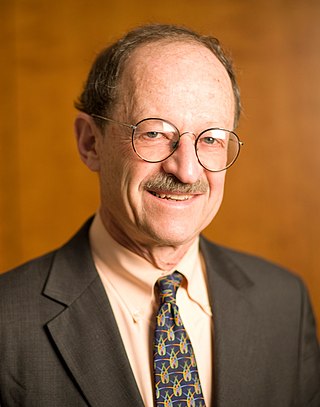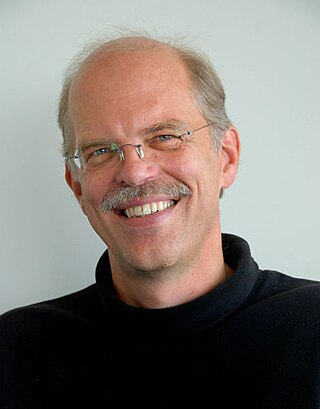Related Research Articles

Harold Eliot Varmus is an American Nobel Prize-winning scientist. He is currently the Lewis Thomas University Professor of Medicine at Weill Cornell Medicine and a senior associate at the New York Genome Center.
The Wnt signaling pathways are a group of signal transduction pathways which begin with proteins that pass signals into a cell through cell surface receptors. The name Wnt is a portmanteau created from the names Wingless and Int-1. Wnt signaling pathways use either nearby cell-cell communication (paracrine) or same-cell communication (autocrine). They are highly evolutionarily conserved in animals, which means they are similar across animal species from fruit flies to humans.

John Michael Bishop is an American immunologist and microbiologist who shared the 1989 Nobel Prize in Physiology or Medicine with Harold E. Varmus and was co-winner of 1984 Alfred P. Sloan Prize. He serves as an active faculty member at the University of California, San Francisco (UCSF), where he also served as chancellor from 1998 to 2009.

Marc Wallace Kirschner is an American cell biologist and biochemist and the founding chair of the Department of Systems Biology at Harvard Medical School. He is known for major discoveries in cell and developmental biology related to the dynamics and function of the cytoskeleton, the regulation of the cell cycle, and the process of signaling in embryos, as well as the evolution of the vertebrate body plan. He is a leader in applying mathematical approaches to biology. He is the John Franklin Enders University Professor at Harvard University. In 2021 he was elected to the American Philosophical Society.
Alexander Jacob Varshavsky is a Russian-American biochemist, noted for his discovery of the N-end rule of ubiquitination. A native of Moscow, he is currently researching at Caltech.

Charles David Allis was an American molecular biologist, and is currently the Joy and Jack Fishman Professor and head of the Laboratory of Chromatin Biology and Epigenetics at The Rockefeller University.

Arthur L. Horwich is an American biologist and Sterling Professor of Genetics and Pediatrics at the Yale School of Medicine. Horwich has also been a Howard Hughes Medical Institute investigator since 1990. His research into protein folding uncovered the action of chaperonins, protein complexes that assist the folding of other proteins; Horwich first published this work in 1989.

Protein Wnt-5a is a protein that in humans is encoded by the WNT5A gene.
Franz-Ulrich Hartl is a German biochemist and Managing Director of the Max Planck Institute of Biochemistry. He is known for his pioneering work in the field of protein-mediated protein folding and is a recipient of the 2011 Lasker Award along with Arthur L. Horwich.
Utpal Banerjee is a Distinguished Professor of the Department of Molecular, Cell and Developmental Biology at UCLA. He obtained his Bachelor of Science degree in Chemistry from St. Stephen's College, Delhi University, India and obtained his Master of Science degree in Physical Chemistry from the Indian Institute of Technology, Kanpur, India. In 1984, he obtained a PhD in Chemistry from the California Institute of Technology where he was also a Postdoctoral Fellow in the laboratory of Seymour Benzer from 1984-1988.
Lewis C. Cantley is an American cell biologist and biochemist who has made significant advances to the understanding of cancer metabolism. Among his most notable contributions are the discovery and study of the enzyme PI-3-kinase, now known to be important to understanding cancer and diabetes mellitus. He is currently Meyer Director and Professor of Cancer Biology at the Sandra and Edward Meyer Cancer Center at Weill Cornell Medicine in New York City. He was formerly a professor in the Departments of Systems Biology and Medicine at Harvard Medical School, and the Director of Cancer Research at the Beth Israel Deaconess Medical Center, in Boston, Massachusetts. In 2016, he was elected Chairman of the Board for the Hope Funds for Cancer Research.

Joan Massagué, is a Spanish biologist and the current director of the Sloan Kettering Institute at Memorial Sloan Kettering Cancer Center. He is also an internationally recognized leader in the study of both cancer metastasis and growth factors that regulate cell behavior, as well as a professor at the Weill Cornell Graduate School of Medical Sciences.
Richard Olding Hynes FRS is a British biologist, a Howard Hughes Medical Institute Investigator, and the Daniel K. Ludwig Professor for Cancer Research at the Koch Institute for Integrative Cancer Research, Massachusetts Institute of Technology. His research focuses on cell adhesion and the interactions between cells and the extracellular matrix, with a particular interest in understanding molecular mechanisms of cancer metastasis. He is well known as a co-discoverer of fibronectin molecules, a discovery that has been listed by Thomson Reuters ScienceWatch as a Nobel Prize candidate.

Johannes (Hans) Carolus Clevers is a Dutch molecular geneticist, cell biologist and stem cell researcher. He became the Head of Pharma, Research and Early Development, and a member of the Corporate Executive Committee, of the Swiss healthcare company Roche in 2022. Previously, he headed a research group at the Hubrecht Institute for Developmental Biology and Stem Cell Research and at the Princess Máxima Center; he remained as an advisor and guest scientist or visiting researcher to both groups. He is also a Professor in Molecular Genetics at the University of Utrecht.

Titia de Lange is the Director of the Anderson Center for Cancer Research, the Leon Hess professor and the head of Laboratory Cell Biology and Genetics at Rockefeller University.

Anthony Rex Hunter is a British-American biologist who is a Professor of Biology at the Salk Institute for Biological Studies and the University of California San Diego. His research publications list his name as Tony Hunter.
Sanjeev Anant Galande is an Indian cell biologist, epigeneticist, academic, former Chair of Biology and the Dean of Research and Development at the Indian Institute of Science Education and Research, Pune He heads the Laboratory of Chromatin Biology and Epigenetics at Indian Institute of Science Education and Research, Pune. He is the founder of the Centre of Excellence in Epigenetics at IISER Pune and is known for his studies on higher-order chromatin architecture and how it influences spatiotemporal changes in gene expression. He is an elected fellow of the Indian National Science Academy and the Indian Academy of Sciences and a recipient of the National Bioscience Award for Career Development of the Department of Biotechnology. The Council of Scientific and Industrial Research, the apex agency of the Government of India for scientific research, awarded him the Shanti Swarup Bhatnagar Prize for Science and Technology, one of the highest Indian science awards, in 2010, for his contributions to biological sciences.
Vivian Li is a Hong Kong-born cell and developmental biologist working in cancer research at London's Francis Crick Institute. She has been researching how stem cells in the human bowel are programmed to ensure a healthy organ and what goes wrong when cancer develops. She is known for her work on the Wnt signalling pathway, discovering a new way that a molecule called Wnt is activated in bowel cancer. She won a Future Leaders in Cancer Research Prize in part for this discovery.

Jacques (Sjaak) Neefjes is a Dutch scientist who made breakthroughs in several research disciplines such as immunology, cell biology, chemistry, cancer biology, microbiology, and epidemiology. He is a professor at the Leiden University Medical Center. In 2020 he was one of four winners of the Spinoza Prize.
Gary Struhl is an American research scientist whose primary areas of research are developmental biology and genetics and genomics. He works as a professor at Columbia University Medical Center, teaching neuroscience within the Department of Genetics and Development.
References
- 1 2 "Roel Nusse". HHMI. Retrieved 6 September 2013.
- ↑ Nusse, Roel; Varmus, Harold (22 May 2012). "Three decades of Wnts: a personal perspective on how a scientific field developed". The EMBO Journal. 31 (12): 2670–2684. doi:10.1038/emboj.2012.146. PMC 3380217 . PMID 22617420.
- ↑ Nusse, R; Varmus, HE (November 1982). "Many tumors induced by the mouse mammary tumor virus contain a provirus integrated in the same region of the host genome". Cell. 31 (1): 99–109. doi:10.1016/0092-8674(82)90409-3. PMID 6297757. S2CID 46024617.
- ↑ "Roel Nusse". Royal Netherlands Academy of Arts and Sciences. Archived from the original on 17 July 2015.
- ↑ "5 top scientists win Breakthrough Prizes in star-studded event". 5 December 2016.
- ↑ "Gairdner Awards 2020 Laureates" . Retrieved 14 December 2021.